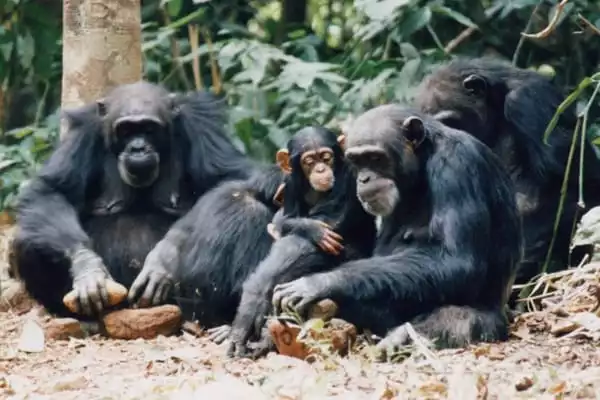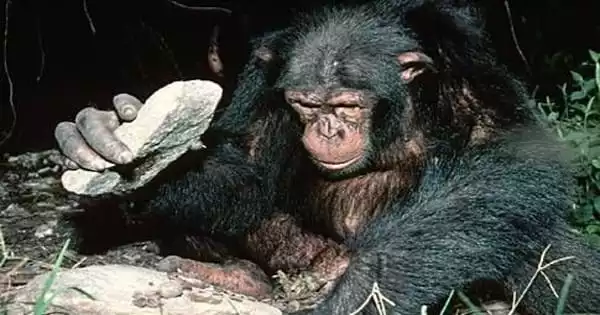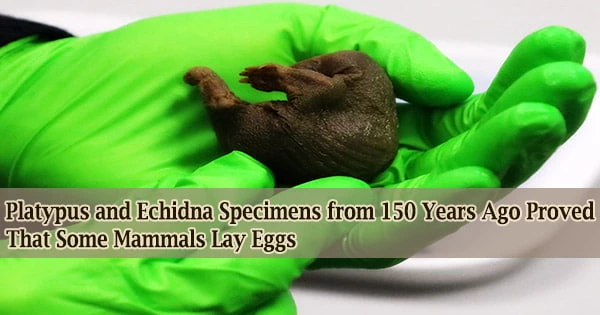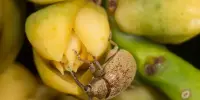Chimpanzees in one region of Guinea crack and eat nuts while others refuse to do so even when given tools, according to a study, and the distinction could reveal light on their culture. As humans, we are considered to have a cumulative culture, which means that skills and technology are passed down and perfected from generation to generation, resulting in behaviors that are more sophisticated than a single individual could devise.
When they come upon nuts and stones, chimps do not know what to do. Researchers from the University of Zurich have now utilized field tests to demonstrate that chimps do not spontaneously develop nut-cracking with tools, but rather must learn such complicated cultural skills from others. As a result, their civilization is more comparable to human culture than is commonly supposed.
Humans have a rich culture that allows them to mimic other people’s behavior. As a result, human civilization is cumulative, as skills and technology accrue over time and grow more efficient or complicated. Chimpanzees, according to the zone of latent solutions hypothesis in Anthropology, do not learn in this manner but can reinvent cultural habits on their own. Kathelijne Koops, a UZH professor in the Department of Anthropology, has now conducted unique field experiments in Guinea’s Nimba Mountains to demonstrate that this is not the case.
Our findings show that chimps acquire cultural habits more like humans, rather than simply inventing a complex tool use behavior like nut-cracking on their own. Our discoveries about wild chimps, our closest living cousins, help to shed light on what it is that distinguishes human culture.
Professor Kathelijne Koops
Some specialists feel that this is unique to humans and that qualities like chimp tool use evolve spontaneously in individuals. Their hypothesis contends that animals can create certain behaviors in the absence of a model to copy. Captive chimps, for example, have been observed apparently autonomously adopting modest tool use such as scooping with a stick and sponging with a leaf. However, these behaviors differ from more complex techniques, like as cracking nuts, and confinement is radically different from the wild. As a result, Kathelijne Koops, an anthropology professor at the University of Zurich, devised a series of studies involving wild chimps in Guinea.
Four experiments with wild chimpanzees
The primatologist studied whether wild chimps may spontaneously originate complicated behaviors such as nut breaking. A set of four experiments were presented to the chimps. The chimps were first given oil palm nuts and stones. The researchers then included a palm fruit in the experimental setting. The nuts were cracked open and placed on top of the stones in the third experiment. Finally, the chimps were given another, easier-to-crack variety of nut (Coula) as well as stones.

Even after more than a year of being exposed to the materials, the chimps visited the nut cracking tests and explored the nuts and stones, but they did not crack any nuts. A total of 35 chimp parties (or sub-groups) attended the studies, with 11 of them paying close attention to the experimental items. When chimps came in larger groups, they were more inclined to investigate the trials. Only one female chimp was witnessed eating from the palm fruit, but the chimps never cracked or ate oil palm or Coula nuts.
While one chimp community in Guinea’s Bossou cracks nuts, another just six kilometers away in Nimba does not. Koops intended to explore if the Nimba people would develop the behavior if given the necessary instruments. In the first scenario, the chimps saw palm nuts in shells and stones that could be used to smash them open.
The second contained palm nuts in shells and stones, as well as edible palm nut fruit. In the third, they found the stones, unshelled palm nuts, and some cracked nut shells. Finally, in the final experiment, they were given stones and Coula nuts, which are more commonly and easily cracked by chimp communities that practice the technique.
Shared evolutionary origin of cumulative culture
“Our findings show that chimps acquire cultural habits more like humans, rather than simply inventing complex tool use behavior like nut-cracking on their own,” adds Koops. The presence of a model to learn from appears to be the missing element. “Our discoveries about wild chimps, our closest living cousins, help to shed light on what it is (and isn’t!) that distinguishes human culture. They specifically argue that there is more continuity between chimp and human cultural evolution than is commonly supposed, and that the human ability for cumulative culture may have an evolutionary origin with chimps.”
















